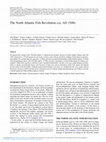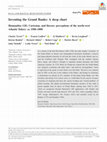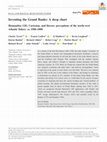Papers by John Nicholls
Ships’ logbooks from the Arctic in the pre‐instrumental period
Geoscience Data Journal, 2015
Ships’ logbooks are now an accepted part of the repertoire of data sources in climate change stud... more Ships’ logbooks are now an accepted part of the repertoire of data sources in climate change studies. This article examines some of the particular issues surrounding logbooks from the Arctic region in the so‐called pre‐instrumental period. Attention is given to the means by which narrative descriptions of wind, weather and sea ice cover can be reliably expressed in index form. Consideration is also given to the various means by which these data can be most effectively managed for scientific analysis as in most cases they were not recorded for such purposes. Many such logbooks remain yet to be digitized and the methods described here can be applied with equal confidence in future through such undertakings using English language documents.
State of the journal
Annals of Emergency Medicine, 2000
Abstract [Waeckerle JF, Callaham ML. State of the journal. Ann Emerg Med. January 2000;35:1-2.]
Fish and Fisheries, 2021
By c. 1990, worldwide captures of marine fish reached the limit of what the oceans could provide,... more By c. 1990, worldwide captures of marine fish reached the limit of what the oceans could provide, given the extractive methods currently available and the limited nature of all marine living resources. The majority of fish stocks globally have since been either fully exploited or over-overexploited (FAO, 2020). During the last millennium, European marine fisheries have risen in five distinct temporal steps, around 1000 AD, after 1500 AD, after 1750, again after 1880 and lastly after 1950. Archaeologists understand the first step as the "fish event horizon," indicated by a rise in volumes of marine fish bones in human settlement sediments around

Quaternary Research, 2019
We propose the concept of the “Fish Revolution” to demarcate the dramatic increase in North Atlan... more We propose the concept of the “Fish Revolution” to demarcate the dramatic increase in North Atlantic fisheries after AD 1500, which led to a 15-fold increase of cod (Gadus morhua) catch volumes and likely a tripling of fish protein to the European market. We consider three key questions: (1) What were the environmental parameters of the Fish Revolution? (2) What were the globalising effects of the Fish Revolution? (3) What were the consequences of the Fish Revolution for fishing communities? While these questions would have been considered unknowable a decade or two ago, methodological developments in marine environmental history and historical ecology have moved information about both supply and demand into the realm of the discernible. Although much research remains to be done, we conclude that this was a major event in the history of resource extraction from the sea, mediated by forces of climate change and globalisation, and is likely to provide a fruitful agenda for future mult...

Geo: Geography and Environment, 2020
As a feature of the Fish Revolution (1400-1700), the early modern "invention" of the Grand Banks ... more As a feature of the Fish Revolution (1400-1700), the early modern "invention" of the Grand Banks in literary and cartographical documents facilitated a massive and unprecedented extraction of cod from the waters of the north Atlantic and created the Cod/Sack trade Triangle. This overlapped with the southern Atlantic Slave, Sugar, and Tobacco Triangle to capitalise modern European and North American societies. In 1719, Pierre de Charlevoix claimed that the Grand Banks was "properly a mountain, hid under water," and noted its cod population "seems to equal that of the grains of sand which cover this bank." However, two centuries later in 1992, in the face of the collapse of the fishery, and fearing its extinction, a moratorium was placed on five centuries of harvesting Grand Banks cod. The invention and mining of its waters serves as a bellwether for the massive resource extractions of modernity that drive the current leviathan and "wicked problem" of global warming. The digital environmental humanities narrative of this study is parsed together from 83 pieces of Grand Banks charting from 1504 to 1833, which are juxtaposed through Humanities GIS applications with English and French cod-catch records kept between 1675 and 1831, letters regarding Cabot's 1497 voyage, Shakespeare's The Tempest (1611) and scientific essays by De Brahms (1772) and Franklin (1786).
Historical Methods: A Journal of Quantitative and Interdisciplinary History
We apply a novel methodology to the study of the Newfoundland cod fisheries in order to determine... more We apply a novel methodology to the study of the Newfoundland cod fisheries in order to determine a reasoned and acceptable chronological value series for total catch amounts in the early modern period where data are scarce. The paper focuses on the two main protagonists in the Newfoundland fisheries arena in that period: France and England. The period 1675-1790 has been selected as a viable and representative chronology for a case study where data, while available in part, are limited and often missing. The new methodology proposed here enables further exploration, input and assessment such that an ever-greater level of accuracy, integrity and robustness may be achieved in future.

Accelerated extractions of North Atlantic cod and herring, 1520-1790
Accelerated extractions of North Atlantic cod and herring, 1520–1790, 2021
We propose the concept of Accelerated Marine Extraction to signify two periods when rapidly incre... more We propose the concept of Accelerated Marine Extraction to signify two periods when rapidly increasing cod (Gadus morhua, Gadidae) and herring (Clupea harengus, Clupeidae) fisheries, c.1540–1600 and c. 1730–1790, exceeded human demographic growth. Total landings vastly exceeded previous assessments and more than doubled between 1520 and 1620 from about 220,000 metric tonnes (t) to 460,000 t. Supplies of cod and herring to the European market peaked in 1788 at more than 1 million t before the unrest connected with the French Revolution brought many fisheries to a temporary halt. Accelerated Marine Extractions increased European food security at times of human demographic growth by almost doubling the supplies of fish protein per capita. While herring was the most important species by 1520, cod dominated through the period 1540–1790, and the trajectories of cod and herring extractions differed significantly. Cod landings increased almost ten-fold between 1520 and 1790, driven by stron...

Geo: Geography and Environment, Mar 31, 2020
As a feature of the Fish Revolution (1400–1700), the early modern “invention” of the Grand Banks ... more As a feature of the Fish Revolution (1400–1700), the early modern “invention” of the Grand Banks in literary and cartographical documents facilitated a massive and unprecedented extraction of cod from the waters of the north Atlantic and created the Cod/Sack trade Triangle. This overlapped with the southern Atlantic Slave, Sugar, and Tobacco Triangle to capitalise modern European and North American societies. In 1719, Pierre de Charlevoix claimed that the Grand Banks was “properly a mountain, hid under water,” and noted its cod population “seem to equal that of the grains of sand which cover this bank.” However, two centuries later in 1992, in the face of the collapse of the fishery, and fearing its extinction, a moratorium was placed on five centuries of harvesting Grand Banks cod. The invention and mining of its waters serves as a bellwether for the massive resource extractions of modernity that drive the current leviathan and “wicked problem” of global warming. The digital environmental humanities narrative of this study is parsed together from 83 pieces of Grand Banks charting from 1504 to 1833, which are juxtaposed through Humanities GIS applications with English and French cod‐catch records kept between 1675 and 1831, letters regarding Cabot's 1497 voyage, Shakespeare's 'The Tempest' (1611) and scientific essays by De Brahms (1772) and Franklin (1786).
Ships’ logbooks are now an accepted part of the repertoire of data sources in climate change stud... more Ships’ logbooks are now an accepted part of the repertoire of data sources in climate change studies. This article examines some of the particular issues surrounding logbooks from the Arctic region in the so-called pre-instrumental period. Attention is given to the means by which narrative descriptions of wind, weather and sea ice cover can be reliably expressed in index form. Consideration is also given to the various means by which these data can be most effectively managed for scientific analysis as in most cases they were not recorded for such purposes. Many such logbooks remain yet to be digitized and the methods described here can be applied with equal confidence in future through such undertakings using English language documents.
Oceans past by John Nicholls

The North Atlantic Fish Revolution (ca. AD 1500)
Quaternary Research, 2019
We propose the concept of the “Fish Revolution” to demarcate the dramatic increase in North Atlan... more We propose the concept of the “Fish Revolution” to demarcate the dramatic increase in North Atlantic fisheries after AD 1500, which led to a 15-fold increase of cod (Gadus morhua) catch volumes and likely a tripling of fish protein to the European market. We consider three key questions: (1) What were the environmental parameters of the Fish Revolution? (2) What were the globalising effects of the Fish Revolution? (3) What were the consequences of the Fish Revolution for fishing communities? While these questions would have been considered unknowable a decade or two ago, methodological developments in marine environmental history and historical ecology have moved information about both supply and demand into the realm of the discernible. Although much research remains to be done, we conclude that this was a major event in the history of resource extraction from the sea, mediated by forces of climate change and globalisation, and is likely to provide a fruitful agenda for future multidisciplinary research.











Uploads
Papers by John Nicholls
Oceans past by John Nicholls